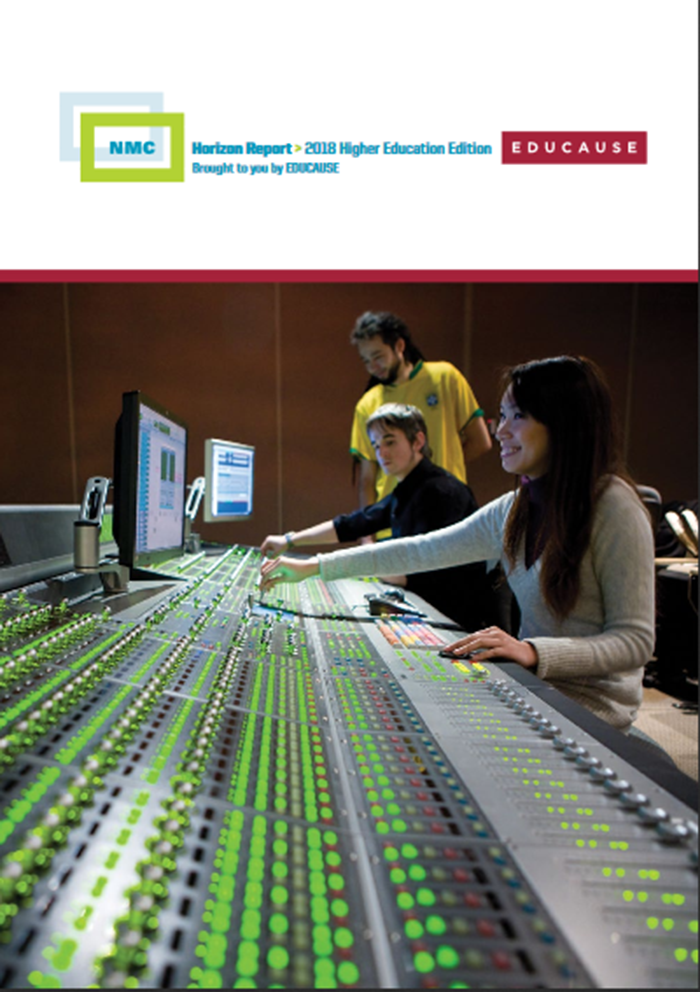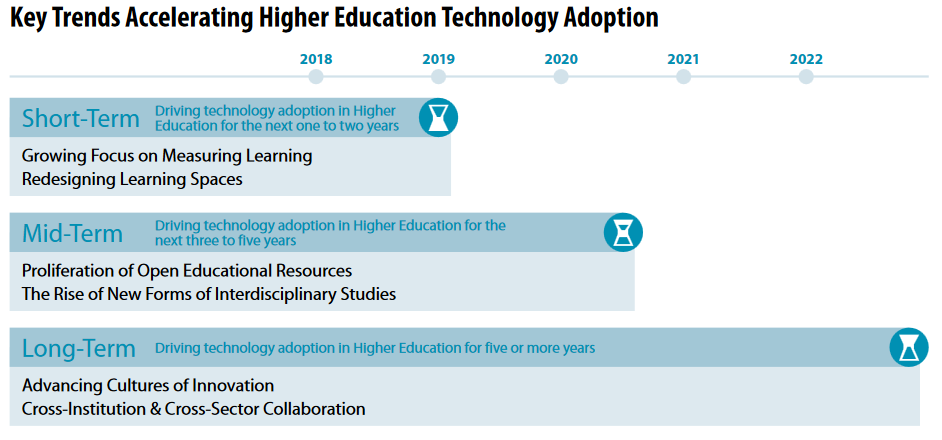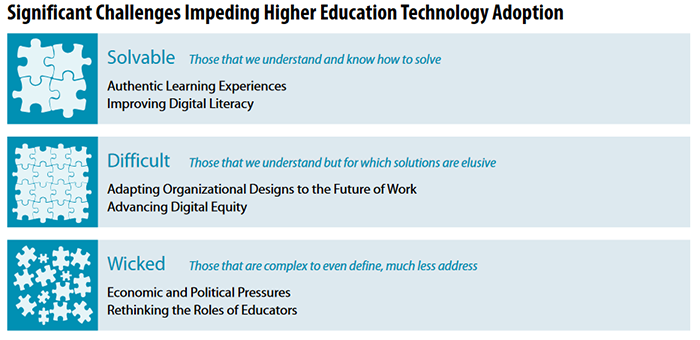Quebec Colleges on Target: Horizon Report 2018
Now in its 16th year, the 2018 Higher Education edition of the Horizon Report is finally out. The Horizon Report is “a reference and technology planning guide for educators, higher education leaders, administrators, policymakers, and technologists.” Each year, the report explores trends, emerging technologies and challenges to the adoption of education technology. When reading this year’s report, you will discover a considerable amount of Canadian content with examples of innovative approaches from across the country. A number of these developments will resonate with the Quebec college network, since we have a number of innovative initiatives of our own.

This year’s front cover features Canadian content, with this photo from the Vancouver Film School, distributed under a Creative Commons BY 2.0 license.
Key Trends Accelerating Technology Adoption in Higher Education
In the short term
Redesigning learning spaces
As higher education continues to experiment with active learning approaches, the report reveals that McGill University in Montreal has published its own guidelines for designing teaching and learning spaces. Profweb has reported on a number of these spaces, most recently highlighting the Steelcase room at LaSalle College.
Growing focus on measuring learning
In Quebec, the competency-based approach, with its savoir, savoir-faire and savoir-être, combined with the ICT Profile for College students seems to demonstrate that we have been moving in the right direction for a number of years.
Employers are increasingly seeking what is called the “T-shaped” graduate: the combination of deep vertical knowledge in a particular domain with a broad set of horizontal soft skills such as teamwork, communications, facility with data and technology, an appreciation of diverse cultures, and advanced literacy skills.

Samantha Adams Becker, Malcolm Brown, Eden Dahlstrom, Annie Davis, Kristi DePaul, Veronica Diaz, and Jeffrey Pomerantz. NMC Horizon Report: 2018 Higher Education Edition Louisville, CO: EDUCAUSE, 2018.
In the mid-term
Proliferation of Open Education Resources (OERs)
There is an increasing interest in the Quebec college network in Creative Commons licencing and OERs, but one of the key issues is maintaining learning objects once they are created. The report points to the work of Canadian researcher Stephen Downes (the co-creator of MOOCs) who developed a framework for the sustainability of OERs that may help us to plan our ongoing efforts to create, maintain and share learning objects in the college system.
The report also highlights changing institutional approaches, citing the University of British Columbia, where “the revised [faculty] promotion and tenure guide encourages the creation and use of OERs. Pre-tenure faculty can now receive formal recognition in promotion and tenure for engaging in OER activities.
Rise of new forms of Interdisciplinary studies
As for interdisciplinary studies, the report states that “faculty members, administrators, and instructional designers are creating innovative pathways to college completion through interdisciplinary experiences, nanodegrees, and other alternative credentials, such as digital badges.“
In Quebec, there is considerable traction with regards to digital badges, with the REPTIC network’s recent CollegeBadge.ca project.
The Horizon Report points to 2 Canadian examples of interdisciplinary approaches, one in Ottawa and another other at the University of Prince Edward Island, where a new Applied Communication, Leadership, and Culture program leads to an interdisciplinary undergraduate degree “that expands the traditional liberal arts curriculum to include cultural awareness, visual communication, and workplace-generated projects to prepare undergraduates for a variety of careers.”
These interdisciplinary studies might even lead to a new sort of student transcript:
This new transcript would capture a broad range of learning experiences from multiple institutions, perhaps including factors such as research, service learning, internships, study abroad, badges, and co-curricular achievements—along with discrete competencies and outcomes—to better represent what students have learned and are capable of doing.
In the long term
Advancing Cultures of Innovation
The Horizon Report mentions that innovation is happening through the integration of entrepreneurial approaches into the curriculum, along with an ethos of students having the right to fail as part of the learning process.
Although not mentioned in the Horizon Report, projects at Cégep Limoilou and Dawson College come to mind along with the development of Collegial Centers for Technology Transfer (CCTT) as shining examples of embedding innovation within educational approaches.
Cross Institution & Cross-Sector Innovation
By forging partnerships, institutions facing financial constraints can pool their resources so that faculty and learners can access a larger variety of digital course materials, data, and technologies than might otherwise be unavailable locally.
The FADIO project, in the Bas-Saint-Laurent and Gaspésie-îles-de-la-Madeleine region, is an example of cross-institution partnership where 7 school boards, 5 CEGEPS, 2 institutes and 1 university have come together to combine their common pedagogical expertise in the area of distance education, and have become key players working on its development.
Orientation 2 of Quebec’s Digital Action Plan foresees just this sort of deployment of technologies to facilitate the sharing of digital resources between educational stakeholders, the creation of an ePortal for distance education courses and promotional tools to call attention to the availability of these resources.
Significant Challenges Impeding Technology Adoption in Higher Education
The 2018 Horizon Report includes a segment on challenges with a varying degree of complexity that can impede the adoption of education technologies and trends.

Samantha Adams Becker, Malcolm Brown, Eden Dahlstrom, Annie Davis, Kristi DePaul, Veronica Diaz, and Jeffrey Pomerantz. NMC Horizon Report: 2018 Higher Education Edition Louisville, CO: EDUCAUSE, 2018.
Solvable challenges
Authentic learning experiences
It is believed that authentic experiences have a significant impact on student engagement and lead to deeper learning for the student. International readers of the report would be wise to have a look at what the SALTISE community of practice is doing to promote active learning in Quebec.
Project-based learning, challenge-based learning, and competency-based learning – all of these pedagogical trends are in service to creating hands-on, real-world experiences for students.
Digital literacy
Student and teacher mastery of technology is a topical issue within the province, with the ongoing work of colleges to implement the ICT Profile for students, and efforts to promote tools for preserving our on-line identity, like the cyberself.ca project.
Wicked challenges
Social, economic and political challenges
There are a number of contextual factors that are shaping educational today. One only needs to think of our efforts to integrate displaced populations in recent history as an example of these challenges. The Horizon Report points to the World University Service of Canada, which places refugees in universities across the country with funding from grants and student unions as an exemplary initiative. The complexity of, and energy required for these projects is important and necessary, but how can we create favourable conditions for everyone involved?
Rethinking the role of educators
Technology and globalization are fundamentally changing the face of education. With media reports of automation and the disappearance of jobs traditionally held by humans, the college network needs to rethink the roles that we are training students for. This change in paradigm will require significant institutional support.
Important Developments in Education Technology for Higher Education
The Horizon Report identifies education technologies that “have the potential to foster real changes in education, particularly in the development of progressive pedagogies and learning strategies, the organization of teachers’ work, and the arrangement and delivery of content.”

Samantha Adams Becker, Malcolm Brown, Eden Dahlstrom, Annie Davis, Kristi DePaul, Veronica Diaz, and Jeffrey Pomerantz. NMC Horizon Report: 2018 Higher Education Edition Louisville, CO: EDUCAUSE, 2018.
At least 5 of the 6 technologies selected from a large list of potential candidates have already made their way into the colleges in Quebec:
The sixth area selected – adaptive learning technologies – will likely develop as our use of learning analytics improves in the medium term.
The World Needs More Cégeps
In my conversations with educational technologists from across Quebec, I know there are a number of us who read the Horizon Report, yet there is rarely any mention of our establishments within this year’s report.
EDUCAUSE has stated that they will continue to publish the Horizon Report in years to come. They also mention in their road map for the future that there is an opportunity for higher education establishments to inform them of exemplary projects that illustrate emerging trends in the report.
So this year, I am humbly issuing a challenge to the college network in Quebec to share information on the ICT profile, competency-based education, innovative technology transfer practices and entrepreneurial projects or any other groundbreaking innovation with EDUCAUSE for the 2019 edition of the report. Perhaps if we are strategic we might even mingle our way into the international panel of experts in the near future!
Let’s show the world in 2019 that the CEGEPs are blazing an innovative trail of our own!

